
Dulce Et Decorum Est. GCSE English Marked by
"Dulce et Decorum Est" is a poem Wilfred Owen wrote following his experiences fighting in the trenches in northern France during World War I. "Here is a gas poem. done yesterday, " he wrote to his mother from the recovery hospital in Craiglockhart, Scotland, in 1917. He was 24 years old.

Dulce et Decorum Est GCSE English Marked by
Analysis. "Dulce et Decorum est" is without a doubt one of, if not the most, memorable and anthologized poems in Owen's oeuvre. Its vibrant imagery and searing tone make it an unforgettable excoriation of WWI, and it has found its way into both literature and history courses as a paragon of textual representation of the horrors of the battlefield.

💄 Dulce et decorum est poem analysis line by line. Dulce et Decorum Est Poem Summary and
"Dulce et Decorum Est" by Wilfred Owen is a poem about the horrors of war as experienced by a soldier on the front lines of World War I. The speaker depicts soldiers trudging through the.

Dulce Et Decorum Est ClairesrHurley
Joelle Taylor - Dulce et Decorum est by Wilfred Owen Watch on Wilfred Owen is one of the most famous poets of the First World War. Poems such as 'Anthem for Doomed Youth', 'The Show' as well as 'Dulce et Decorum est' were for many people the first time they had heard the reality of what life was like for front-line troops.
A Retail Life After the MFA Analysis of "Dulce Et Decorum Est" by Wilfred Owen
Dulce et decorum est pro patria mori [a] is a line from the Odes (III.2.13) by the Roman lyric poet Horace. The line translates: "It is sweet and proper to die for one's country."
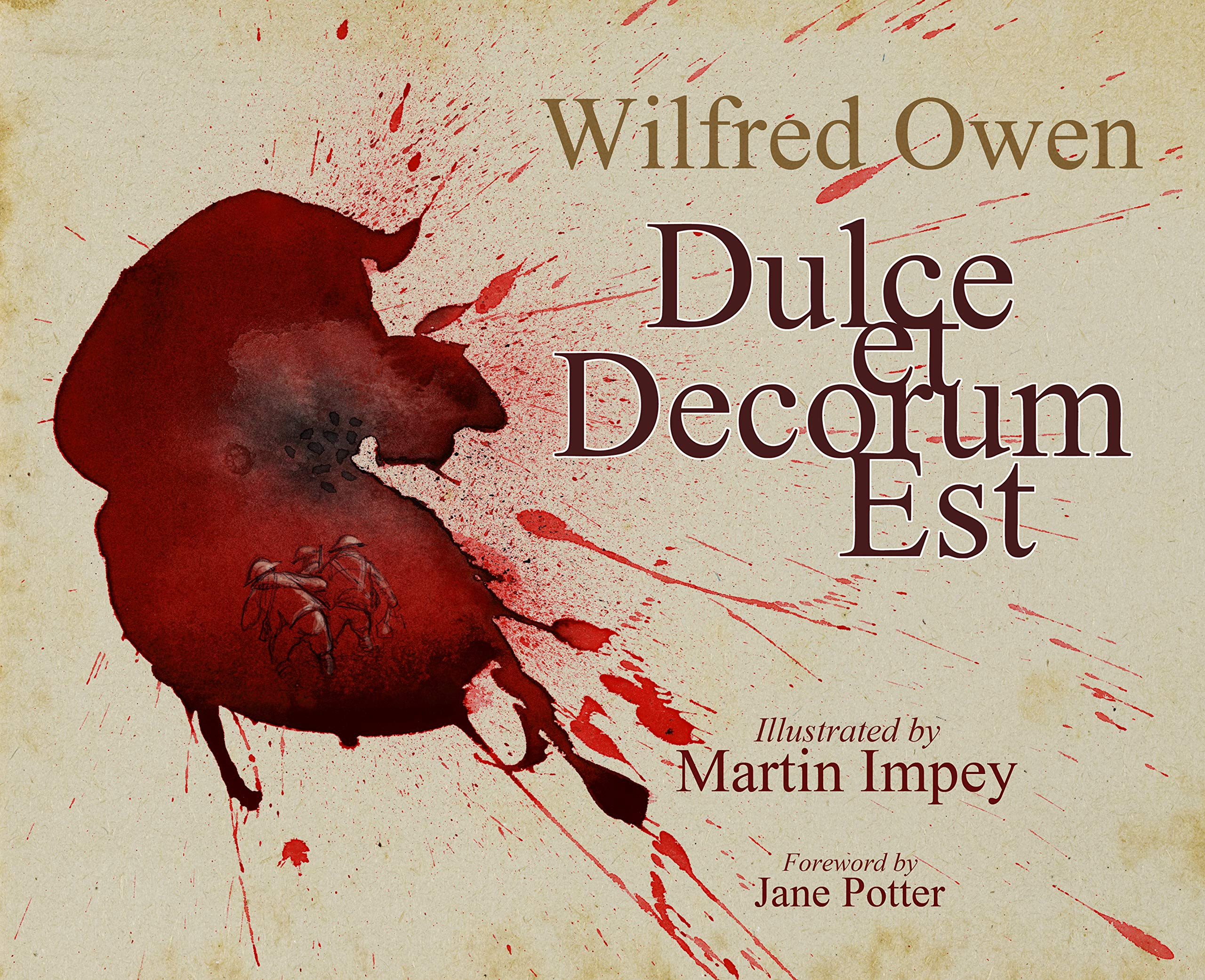
😎 Wilfred owen dulce et decorum est meaning. Dulce Et Decorum Est by Wilfred Owen. 20190214
Dulce et Decorum Est is a poem about war, how war is perceived by the people, and what it is to live and die in a war. The poem was written by Wilfred Owen, who was a soldier in World War I and has first-hand experience with the atrocities of war. Dulce et Decorum Est can be divided into two parts.

Dulce et Decorum est Alchetron, The Free Social Encyclopedia
Wilfred Owen Anti-war poem Dulce et Decorum Est: About the poem The poem Dulce et Decorum Est is a prominent anti-war poem written by Wilfred Owen about the events surrounding the First World War. Owen served as a Lieutenant in the War and felt the soldiers' pain and the real truth behind war.
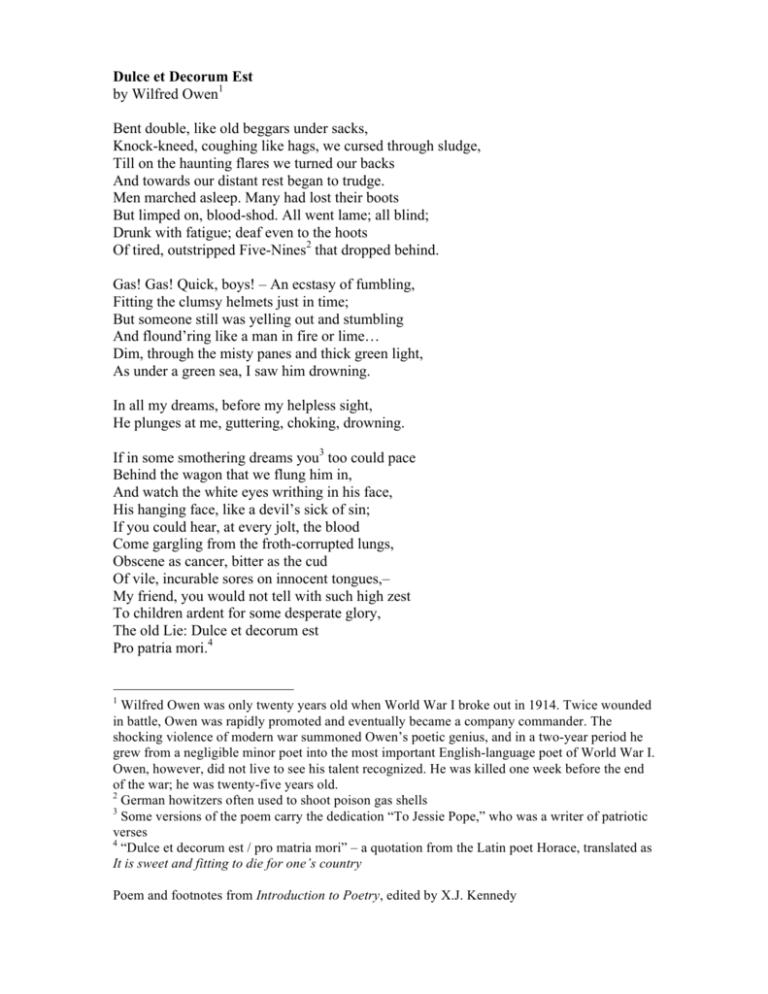
Dulce Et Decorum Est
To children ardent for some desperate glory, The old Lie: Dulce et decorum est Pro patria mori. Summary of Dulce et Decorum Est Popularity: "Dulce et Decorum Est" is a famous anti-war poem by Wilfred Owen. It was first published in 1920.
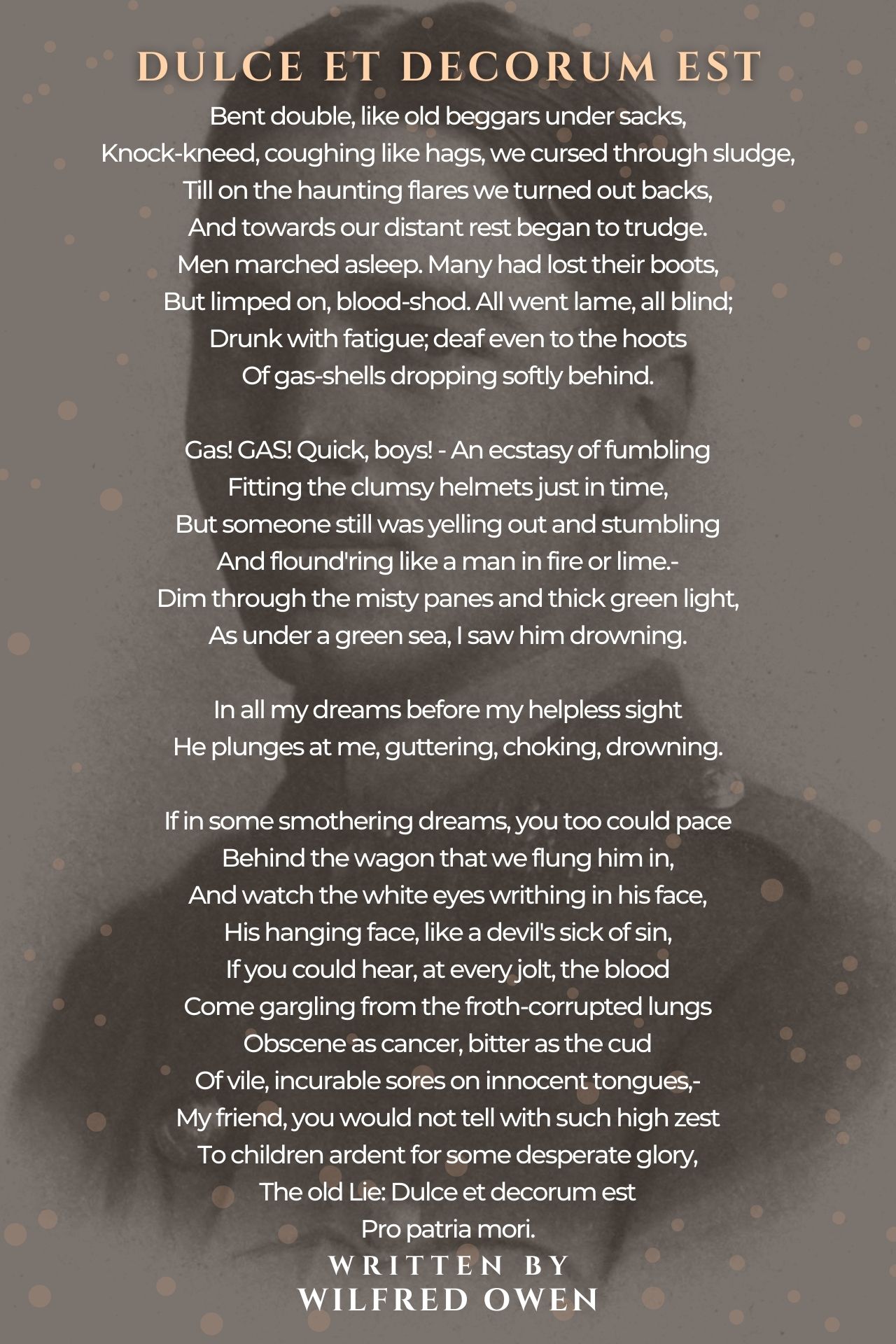
Essays on "Dulce Et Decorum Est" Book Summary & Free Paper Examples
Overview. Among Wilfred Owen's most famous poems, "Dulce et Decorum Est" was written in 1917 while he was in Craiglockhart War Hospital in Scotland, recovering from injuries sustained on the battlefield during World War I. The poem details the death of a soldier from chlorine gas told by another soldier who witnesses his gruesome end.

Dulce Et Decorum Est Poem analysis, English literature notes, Gcse english literature
"Dulce et Decorum est" is a poem written by Wilfred Owen during World War I, and published posthumously in 1920. Its Latin title is from a verse written by the Roman poet Horace: Dulce et decorum est pro patria mori. [3]
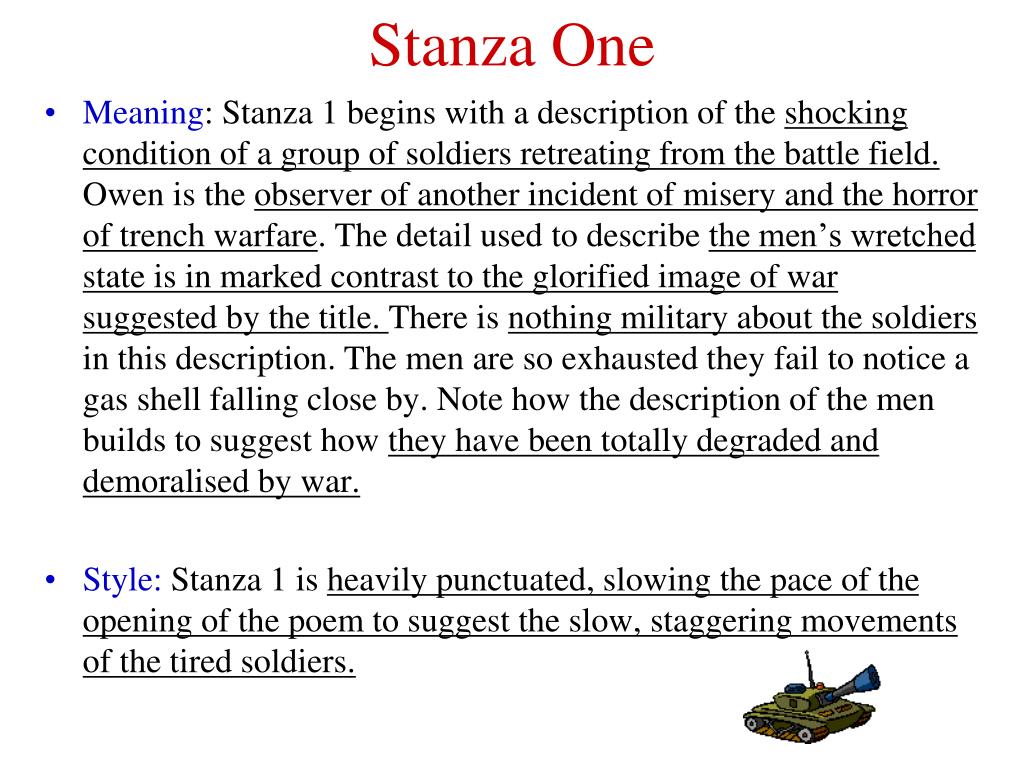
PPT ‘Dulce Et Decorum Est’ Analysis. PowerPoint Presentation, free download ID650658
The The Analysis of Dulcet et Decorum Est. is provided below by first giving a brief description on the background followed by the poem structure and its meaning.. Background The poem Dulce et Decorum est is a masterpiece written in 1917 by Wilfred Owen. The poem was written during the World War 1 and it also has a lot to say about the war. It was actually published after Owen's death in 1920.

Annotated Dulce Et Decorum Est Analysis Dulce et decorum est Annotated dulce et decorum est
'Dulce et Decorum Est' by Wilfred Owen, challenging romantic notions of war, is a robust anti-war poem that makes the reader face the petrifying harrowing truths of war with graphic imagery and blood-curdling nuances. View Poetry + Review Corner Poem Analyzed by Elise Dalli B.A. Honors Degree in English and Communications

Dulce Et Decorum Est Dulce Et Decorum Est Poem by Wilfred Owen Dulce et decorum est, Poems
The Latin phrase "Dulce et decorum est pro patria mori," which lends the poem its title and concluding lines, comes from a poem of Horace, writing under the emperor Augustus Caesar. It means, "It is sweet and fitting to die for one's country.".

Dulce Et Decorum Est Summary Poetry Unrest
The interpretation here is that Owen makes the reader reflect on the actual positioning of war - it is not about laurels; it is about pain. World War I took away millions of innocent young lives who bravely fought for their homeland in the bloody fight. The poem "Dulce et Decorum Est" by Wilfred Owen makes readers rethink the definition.

Dulce Et Decorum Est Analysis Lesson War Poetry KS3/4 English Teaching Resources
" Dulce et decorum est " (meaning it is sweet and fitting) ends the penultimate line. The following bisecting line break and the last line's short length (in comparison to the rest of the.
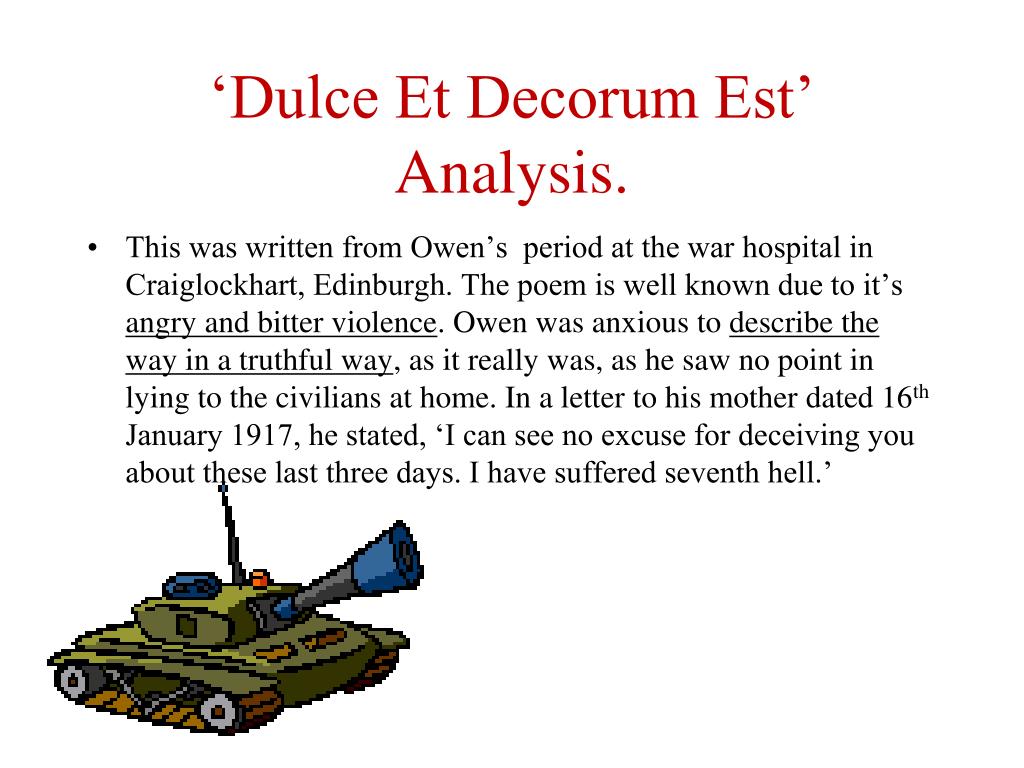
PPT ‘Dulce Et Decorum Est’ Analysis. PowerPoint Presentation, free download ID650658
To children ardent for some desperate glory, The old Lie: Dulce et decorum est Pro patria mori. Notes: Latin phrase is from the Roman poet Horace: "It is sweet and fitting to die for one's country." N/a Source: Poems (Viking Press, 1921)